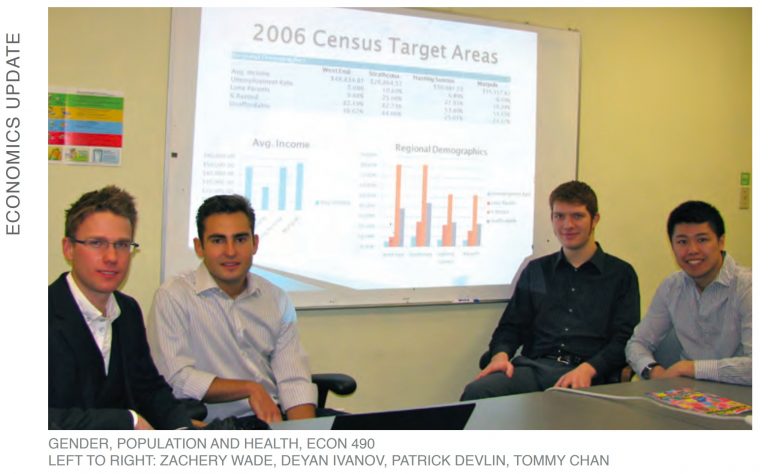Community-Based learning / Research
Initiated and Spearheaded the Community-Based Research initiative for the 4th year undergraduate research course. Students from the Econ490 course were partnered with NICCSS, Vancouver Rent Bank. 2011-2015
As part of UBC’s initiative to facilitate community-based research (UBC-CBR/CLI), this course offered research projects in participation with Community organizations. Whereas most undergraduate 4th year economic curricula focus on theory or data analysis, Community-Based Research (CBR) lets students use their theoretical knowledge and analytical skills to help people in their own community. VSE’s Course was recognized for using a “pedagogical approach in partnering with diverse community organizations and enabling students to engage in community-based projects.”
Crunching the Numbers on Vancouver’s Affordable Housing Crisis: Econ Students Team Up with NICCSS for Community-Based Research (2012) BY lara kordic
Last year’s Occupy movement prompted many of us to re-evaluate our assumptions about poverty. At UBC, four students in Dr. Nisha Malhotra’s Economics 490 class—Gender, Population and Health—took that evaluation one step further. As part of UBC’s initiative to facilitate community-based learning, this course gave students the option of participating in a research project that helps a non-profit organization better understand a specific issue.
Whereas most undergraduate economic curricula focus on theory or data analysis, Community-Based Research (CBR) lets students use their theoretical knowledge and analytical skills to help people in their own community.
-
- “You get a degree in econ, but when you go out into the real world you’ll be interacting with real people and using layman’s terms. Research should be based on collaboration, and CBR really offers that experience.” Tommy Chan (Econ490 Student)
This spring, fourth-year students Tommy Chan, Patrick Devlin, Deyan Ivanov, and Zach Wade teamed up with the Network of Inner City Community Services Society (NICCSS)—a consortium of community-based organizations that coordinate and deliver social services to Vancouver’s urban neighbourhoods—to address the economic viability of setting up a rent bank in Vancouver. The rent bank, which was recently approved for funding by Vancouver City Council, is designed to provide temporary help to people facing unexpected financial hardships that prevent them from covering their living expenses. As the program is aimed at those who are in short-term rental arrears and at risk of eviction, its primary objective is to prevent homelessness.
UBC Community Based Research with Vancouver Rent Bank
The Vancouver rent bank will serve Canada’s poorest neighbourhood, the Downtown Eastside, along with other areas of Vancouver that have high proportions of renters, reflecting the recent decline of affordable housing throughout the city. According to Kate Hodgson, NICCSS’s executive director, the rent bank will provide loans at an average value of $830, and recipients will have 24 months to pay off the balance. Hodgson anticipates that the program will allocate loans to about 135 households over three years and prevent 530 people from becoming homeless.
 On April 2, the students from Dr. Malhotra’s class presented their research findings to NICCSS. Using data related to demographics, income, and debt levels in BC compared with the rest of Canada; assessing the availability and viability of other short-term credit sources, including payday loans; and investigating the cost of homelessness in relation to the cost of setting up and operating a rent bank, the students concluded that the rent bank program would be far more economically (not to mention socially) beneficial than allowing people to lose their homes when they are unable to pay their rent. The presentation not only identified which segments of the population would benefit most from the rent bank, but it also analyzed the possible factors that perpetuate the cycle of poverty within certain demographic groups and shed light on the economic sacrifices that people are most likely to make when faced with financial stress. The data re-affirmed NICCSS’s mandate of providing a viable alternative to homelessness. By putting the rent bank in an economic context, the students added a new dimension to what is often regarded as a purely social issue.
On April 2, the students from Dr. Malhotra’s class presented their research findings to NICCSS. Using data related to demographics, income, and debt levels in BC compared with the rest of Canada; assessing the availability and viability of other short-term credit sources, including payday loans; and investigating the cost of homelessness in relation to the cost of setting up and operating a rent bank, the students concluded that the rent bank program would be far more economically (not to mention socially) beneficial than allowing people to lose their homes when they are unable to pay their rent. The presentation not only identified which segments of the population would benefit most from the rent bank, but it also analyzed the possible factors that perpetuate the cycle of poverty within certain demographic groups and shed light on the economic sacrifices that people are most likely to make when faced with financial stress. The data re-affirmed NICCSS’s mandate of providing a viable alternative to homelessness. By putting the rent bank in an economic context, the students added a new dimension to what is often regarded as a purely social issue.
Seeing his research add value to a real-life community-based project was a rewarding experience for Patrick Devlin, who said he felt motivated to do well on the project “because it actually helps people.” Deyan Ivanov added, “It felt good to do something that matters. And the group experience [was valuable] because it offered different perspectives.”
Dr. Malhotra noted that students who participate in CBR seem more motivated to succeed than those who engage exclusively in traditional, theory-based research projects. In addition to challenging and inspiring students by opening their minds to real socio-economic problems in their city, these projects give undergraduates a taste of the type of research they may encounter later in their careers.
At the outset of the NICCSS project, most of the students held certain assumptions about Vancouver’s homelessness problem and the rent bank’s potential clients. “I thought it would be a niche population, but it’s a lot broader,” said Devlin, referring to the large number of Vancouverites who cannot afford their rent, often sacrificing food and transportation to keep a roof over their heads. “I was most surprised that one in five children belongs to a single-parent family,” said Chan. “If the mother has a low income and low level of education, and she can’t support her children, the cycle [of poverty] is just going to keep going.”
The students were also shocked at how quickly a household can slip through the cracks. “If you go into debt one time and can’t pay it back, it’s just going to get worse and worse,” said Ivanov. “People are using payday loans to pay off other payday loans.”
Ultimately, the students proved that applying economic analysis to a social problem does not reduce people to statistics. Quite the opposite. For the students, collaborating with a social organization put a human face on Vancouver’s poor population, while their economic insight helped solidify NICCSS’s position. “Any way you cut the numbers,” concluded Zach Wade, “rent banks are cheaper than homelessness.”
Econ490 with Professor Malhotra
